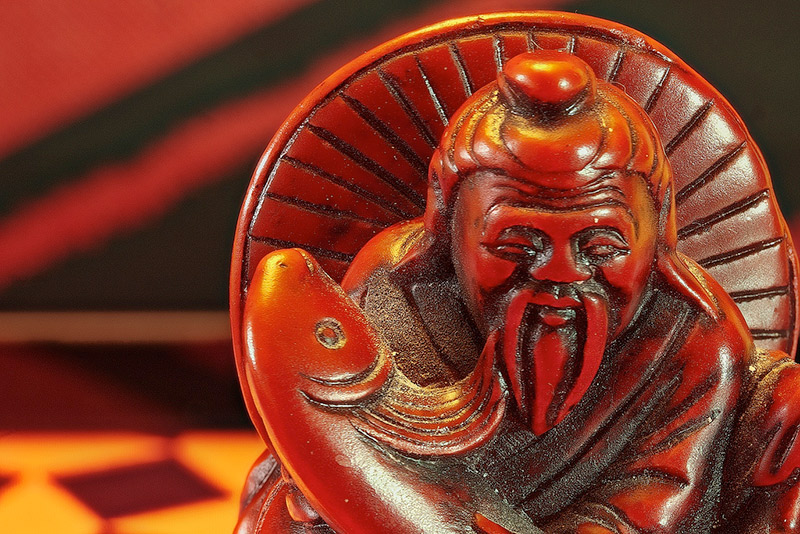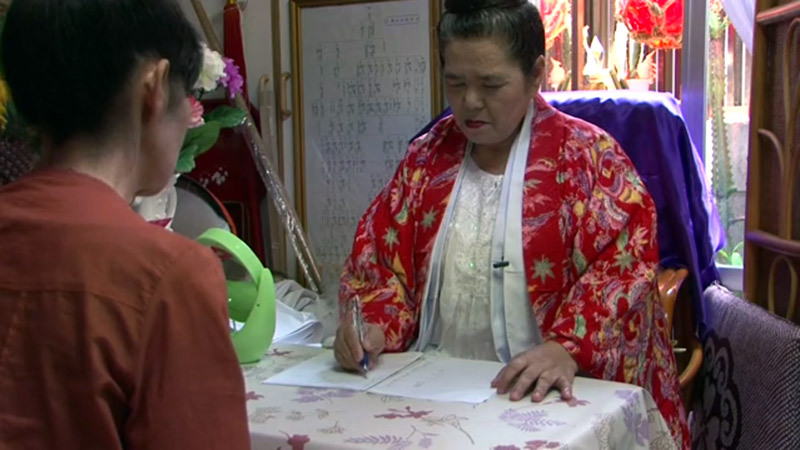What does one do when beset by illness, bad luck, or a case of lost keys? If you’re in Okinawa one possibility is to consult a yuta. The yuta are female spirit mediums who have been around for centuries, though it was not always easy for them. Many people know of the Salem witch trials and other examples of such persecution throughout Western history. However, I would venture to guess that very few would know that there were similar occurrences in the history of Okinawa. In fact, few foreigners are aware that prior to 1879 Okinawa was a separate country from Japan, called the Ryukyu Kingdom, with its own culture and language. For a quick overview of the kingdom’s history you need look no further than the Tofugu article, “The Forgotten Dynasty of the Ryukyu Islands.” For now, let’s take a look at who the yuta were and why they were persecuted.
Yuta, Noro, And Religion In The Ryukyu Islands

Ryukyu also had its own distinct set of religious beliefs. Buddhism was present, but never as influential as it was in Japan or China. Confucianism was introduced from China, and when its influence grew in the seventeenth century, it came to be a driving force behind the persecution of the yuta. Deeper rooted than either of these were Ryukyu’s native animistic beliefs. In a manner similar to the Japanese, Ryukyuans believed in many kami. Some of these were minor localized spirits, while others were more akin to gods. The “hi nu kan”, the hearth spirit, was the focus of most families’ daily spiritual life. It was represented by three small stones, usually placed in the kitchen.
There were also community hi nu kan whose rites were conducted by a priestess, or “noro”. The noro were the official priestesses of Ryukyu. While the king of Ryukyu and his ministers formed the hierarchy of government, the head priestess and other noro formed the religious hierarchy. The head noro was known as the “kikoe ōgimi”, and was often the king’s sister or another relative. Her power was theoretically equal to the king’s, though this was rarely if ever the case. Even so, the position of noro was a respected one. As mentioned above, it was the duty of a noro to tend to their community’s hi nu kan, as well as the general spiritual well-being of the people.
Compared to the yuta, the noro are an interesting contrast. At the most basic level, noro were priestesses, while the yuta were spirit mediums. They were both women involved in rites, rituals, and spiritual work. However, positions such as the noro were generally inherited matrilineally, and were part of a system. On the other hand, yuta were individuals who had “awakened to their own psychic or spiritual abilities.” Being a yuta was a self-proclaimed vocation, with no requirements needed or qualifications to be shown. If someone had a problem they could pay a yuta to consult with the spirits and find a solution, and there were always people with problems.
A Gift Or A Curse?

Though business may have been good for some yuta, their life was not always a walk in the park. In the trial records of the Ryukyu kingdom, one can find cases where murders were attributed to a yuta’s curse, particularly in the late seventeenth and early eighteenth centuries. Yuta were from time to time accused of summoning spirits to kill, sometimes on behalf of a client or sometimes based on a personal vendetta. In most of these murder cases the royal government received a notification of the incident, then an investigation was conducted, and the accused woman was generally paraded about the village concerned before being beheaded (or occasionally exiled).
The yuta also became the target of more widespread persecution by the Ryukyuan government. In 1609 the Shimazu clan of southern Kyushu invaded the Ryukyu Islands and conquered them. Rather than abolish the Ryukyuan monarchy and absorb the islands into their territory completely, the Shimazu decided to allow the kingdom to continue, while keeping the invasion a secret from the Chinese, and paying tribute to the Shimazu. At the time Japanese trade with China was quite limited, but by these means the Shimazu could get a piece of the regular trade between Ryukyu and China. This remained the state of affairs until Japan officially annexed Okinawa in 1879 and finally dissolved the kingdom.
During the period Shimazu domination, everything Chinese was encouraged in Ryukyu and everything Japanese discouraged (if not prohibited). In this way Japanese influence on Ryukyu was downplayed, and Sino-Ryukyuan relations strengthened. Confucianism flourished in Ryukyu during this period, and what was once the province of scholars was promoted among the general populace. The Confucian scholars of the monarchy also felt compelled to criticize what they felt were superstitions.
Arguing The Ghosts Away

Although, Confucian scholars had philosophical differences with the yuta, they also made a practical case against them. One can see this in the introduction to the Toki Yuta Togasadame, the 1728 prohibition of the toki and yuta issued by the royal government. Toki were (predominantly male) fortune tellers who people consulted to divine what days would be auspicious for various events and undertakings.
Toki and yuta have existed in our society since ancient times. They have even been established within the royal government. But recently the number of toki and yuta has increased markedly, becoming a hindrance to society. Because they are employed in farming villages, the result has been the highly improper situation of cows, pigs, chickens, and the like being lost and expenses accumulating. This impoverishes the peasants.
Another representative example of these Confucian critiques was included in Go-kyōjō, a guide to proper behavior which was written under the royal government’s auspices and distributed to local officials to be read regularly to those within their jurisdictions. Its addresses argues that toki and yuta are only peddling superstition.
Because those called toki and yuta think wholly of their own livelihood, repeat various lies, and exist deceiving people, they are rigidly prohibited. These types of people throw the world’s order into disarray and from now on are strictly forbidden, but furthermore, the people deceived by these types are also of no use.
At the homes of the sick, they do things like summon ghosts and spirits and tremble fearfully. It is said that vengeful spirits use magic to bother people, but there are no such things. Perhaps it would seem that if spirits have that kind of power, then at time of war, they could curse and kill enemy soldiers, but because they don’t actually have that power, in the great powers of the world bloody wars have not ceased. It is said that ghosts also trouble people with telekinesis, but as I thought, they, like spirits, hold no power. Perhaps if ghosts had that power, then relying on that power they could settle grudges could they not? Because that kind of power does not exist begrudged people can also be secure.
Confucian government officials argued against the yuta and grounds of superstition and expense, but as we saw earlier there was another group of spiritually powerful women, the noro. The noro never faced persecution like the yuta did. The key difference was that the yuta were sanctioned and, more importantly, controlled by the royal government. The government did not appreciate individualistic women with power who were not under their control.
Despite the royal government’s best efforts, their attempt to suppress the yuta never enjoyed much success. Their popularity proved to be too great for them to disappear. Though they might be accused of murder from time to time, they were consulted by people from every strata of Ryukyuan society, including some of the scholars who were “supposed to know better.” In fact, there are still yuta practicing today. So, next time you need some help from the spirits hop a plane to Okinawa and hire yourself a yuta.
